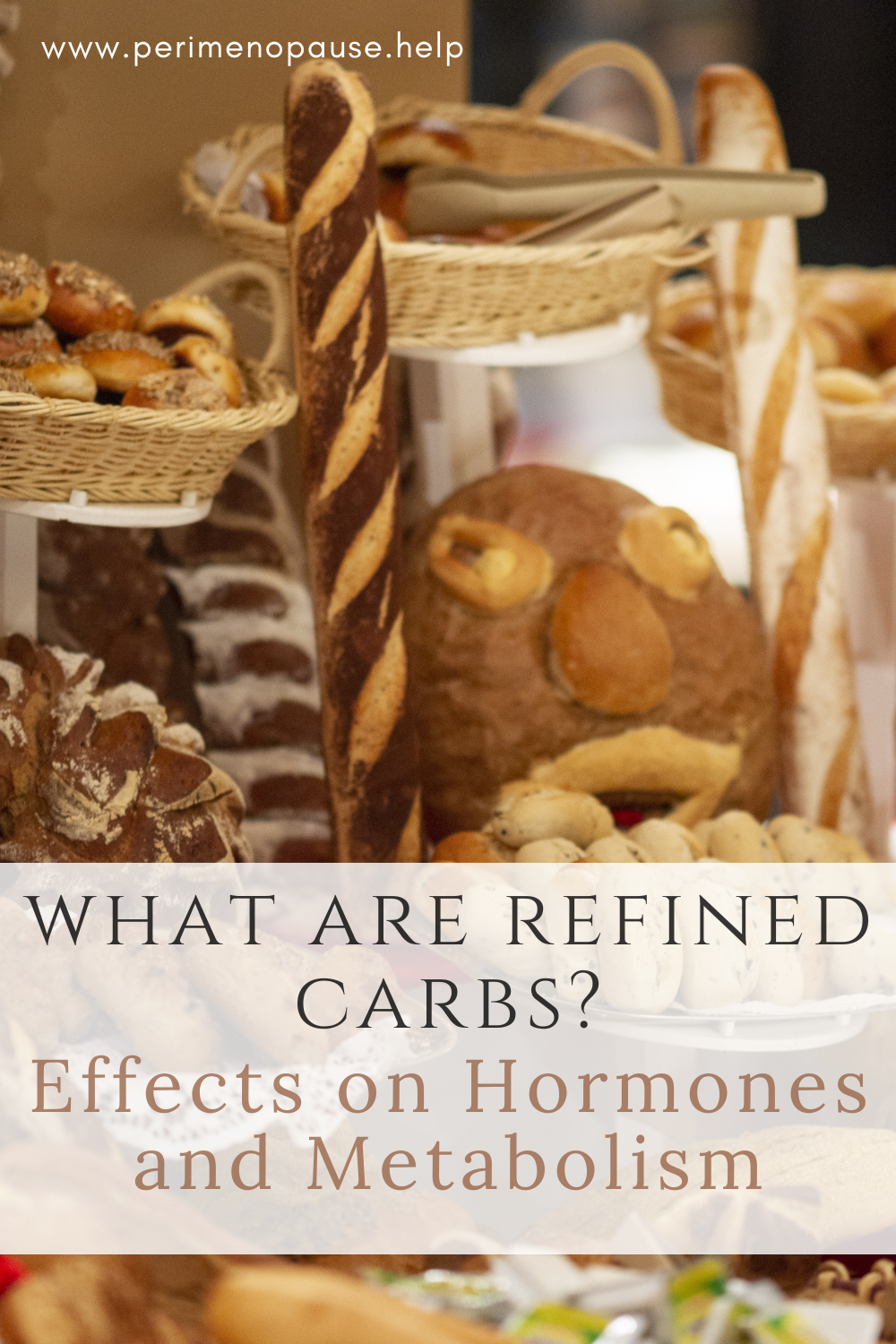Ok, we all hear about the dreaded “refined carbs,” but what are refined carbs and how do they hit different in our 40s and beyond?
If your weight or cravings have shifted in your 40s, refined carbs might be one factor worth looking at more closely. During perimenopause and menopause, changes in hormones alter how we respond to certain foods, especially fast-absorbing carbohydrates.
Let’s explore why refined carbs can have a bigger impact now than they used to.
What Are Refined Carbs? A Simple, Clear Definition
Refined carbohydrates are processed foods that have had most of their nutritional value stripped away during manufacturing. Think of them as carbs that have been “simplified” – and not in a good way!
Why are they different from whole or complex carbs
Complex carbohydrates (found in whole foods) contain the complete package: fiber, vitamins, minerals, and a more complex molecular structure. This complexity is actually your friend.
Refined carbs, on the other hand, have been processed to remove these beneficial components, leaving behind simple carbohydrates that your body breaks down too quickly (and that hit your blood sugar too quickly leading to insulin resistance and weight gain).
The difference is like comparing a nutrient-rich forest (complex carbs) to a barren landscape (refined carbs).
How refinement removes fiber, vitamins, minerals
The refining process literally strips away the most nutritious parts of grains. For example, when whole wheat becomes white flour, the bran and germ – containing fiber, B vitamins, iron, and other essential nutrients – are removed.
What remains is mostly the starchy endosperm, which gives refined grain products their finer texture and longer shelf life but offers little nutritional value. This manufacturing process transforms what was once a nutrient-dense food into empty, blood sugar-spiking calories.
What is the glycemic index?
The glycemic index (GI) measures how quickly foods raise blood sugar levels. Foods with a high glycemic index cause rapid spikes in blood glucose, followed by crashes that leave you hungry again soon after eating.
Refined carbs typically have a high glycemic index because, without fiber to slow digestion, they’re converted to sugar almost immediately. This rollercoaster effect is particularly problematic for women over 40, as our insulin sensitivity naturally decreases with age.
Examples of Refined Carbs and Their Glycemic Index
Refined Sugars
These simple carbs cause some of the most dramatic blood sugar spikes because they digest almost instantly and offer no fiber or nutrients to slow absorption.
-
Table sugar (GI: 65) — used in cookies, cakes, sauces, and everyday home baking
-
High fructose corn syrup (GI: 73) — common in soda, sports drinks, sweetened yogurts, and packaged breads
-
White sugar (GI: 65) — added to flavored coffee drinks, pastries, cereals, and instant oatmeal (to name a few things, it’s really in so much more)
-
Cane sugar (GI: 65) — found in “organic” or “natural” packaged snacks and juices (they may have more vitamins but they still spike the blood sugar)
-
Sugary drinks (GI: 63–68) — soda, lemonade, sweet tea, flavored lattes, and energy drinks
-
Candy and sweets (GI: 60–70) — gummies, chocolate bars, hard candies, and “low-fat” sweets
-
Baked goods with added sugars (GI: 55–75) — muffins, donuts, quick breads, packaged cookies, and coffee shop treats
Refined Grains
These staples of the American diet have been stripped of fiber, vitamins, and minerals, making them fast to digest and more likely to spike blood sugar.
-
White bread (GI: 70–75) — sandwich loaves, toast, fast-food buns, and restaurant rolls
-
White rice (GI: 73) — takeout rice bowls, sushi rolls, and instant rice pouches
-
White pasta (GI: 55–60) — spaghetti, boxed macaroni, traditional lasagna noodles
-
Crackers (GI: 70–80) — saltines, buttery crackers, cheese-flavored crackers, and kid snack packs
-
Instant oatmeal (GI: 65–70) — flavored packets with added sugars that digest faster than steel-cut oats
-
Most breakfast cereals (GI: 70–85) — cornflakes, crisped rice cereals, sweetened granola, and “whole grain” cereals that are still highly processed
-
White flour products (GI: 70–75) — pizza crust, pancakes, waffles, tortillas, and most baked goods
Ultra-Processed Snacks
These convenience foods combine refined grains, sugars, and industrial oils—creating fast absorption and stronger cravings.
-
Potato chips/Tortilla chips (GI: 55–60) — classic chips, kettle chips, baked chips, flavored snack bags, and packaged tortilla chips
-
Packaged desserts (GI: 65–75) — snack cakes, brownies, shelf-stable pies, and frosted bars
-
Pastries (GI: 65–70) — croissants, danishes, turnovers, and store-bought muffins
-
French fries (GI: 75–80) — fast-food fries, frozen fries, seasoned fries, and curly fries
-
Pretzels (GI: 80–85) — classic pretzels, sticks, nuggets, and “whole grain” versions that still spike blood sugar
-
Most packaged snack foods (GI: 60–80) — granola bars, “energy bars,” rice cakes, baked chips, and flavored crackers. Protein bars are different, though, as the protein tends to lead to a lower GI overall.
Why Refined Carbs Hit Women Harder After 40
Increasing insulin resistance in midlife
As we age, our bodies naturally become less efficient at processing carbohydrates. After 40, insulin resistance tends to increase, meaning cells don’t respond as well to insulin’s signals to absorb glucose from the bloodstream.
This age-related change makes the blood sugar spikes from refined carbs even more problematic, as your body struggles to clear glucose from your blood effectively. The result? More sugar gets converted to fat, especially around your midsection.
Lower muscle mass
Another midlife metabolism challenge: we naturally lose muscle mass as we age (unless we’re diligent about strength training). Less muscle means fewer places for glucose to be stored and used.
When you eat refined carbs, that glucose has fewer places to go, increasing the likelihood it’ll be converted to fat. Muscle tissue is metabolically active and helps maintain healthy insulin levels – so this double-whammy of muscle loss and refined carb consumption can accelerate weight gain.
Greater cortisol fluctuations
Perimenopause and menopause bring hormonal changes that often increase cortisol fluctuations. Cortisol is your primary stress hormone, and it has a complex relationship with blood sugar.
When refined carbs cause blood sugar to spike and then crash, your body perceives this as stress and releases more cortisol. Higher cortisol levels then prompt your body to store more fat, particularly around your abdomen – creating a vicious cycle.
Slower metabolic flexibility
Metabolic flexibility – your body’s ability to switch between burning carbs and burning fat for fuel – naturally decreases with age. Refined carbs exacerbate this problem by keeping your body reliant on glucose.
When you regularly consume simple carbs, your body never gets the chance to tap into fat stores for energy. This reduced metabolic flexibility makes weight management increasingly difficult after 40.
How Refined Carbs Affect Hormones
Insulin & Blood Sugar Spikes
Leads to energy crashes, cravings, midsection weight gain
When you eat refined carbs, your blood sugar rises rapidly, triggering a large insulin response. This hormone rushes to clear glucose from your bloodstream, often overshooting and causing your blood sugar to crash.
These dramatic swings can leave you feeling tired, irritable, and craving more carbs – creating a cycle that’s particularly difficult to break after 40. Worse yet, consistently high insulin levels signal your body to store fat, especially around your abdomen, contributing to that stubborn midlife midsection weight gain.
Want a simple way to start balancing your blood sugar and hormones?
Download my free 3-Day Perimenopause Meal Plan & Supplement Guide—designed specifically to support energy, offer lower GI foods, reduce cravings, and stabilize hormones.
👉 Grab it here!
Cortisol & Stress Hormones
Blood sugar swings trigger stress responses
Your body interprets blood sugar crashes as a threat to survival, triggering the release of stress hormones like cortisol. This physiological stress response was helpful when our ancestors faced actual food shortages.
In today’s world, where refined carbs are everywhere, these constant cortisol fluctuations create chronic stress on your body. For women in midlife, already experiencing hormonal fluctuations, this added stress can worsen perimenopausal symptoms and make weight management even harder.
Estrogen & Progesterone Balance
In perimenopause, refined carbs worsen estrogen dominance
During perimenopause, many women experience estrogen dominance – a state where estrogen levels are high relative to progesterone. Refined carbs can worsen this imbalance by increasing insulin, which affects how estrogen is metabolized.
Higher insulin levels can lead to increased estrogen production and decreased estrogen clearance, potentially worsening symptoms like heavy periods, breast tenderness, and mood swings (as well as unexplained weight gain). This complex hormonal interplay makes refined carbs particularly problematic during this life stage.
In late peri/menopause refined carbs can worsen hot flashes and sleep issues
As you move into late perimenopause and menopause, blood sugar instability from refined carbs can trigger or intensify hot flashes and night sweats. The blood sugar crashes that follow high-GI foods can mimic the adrenaline surges associated with vasomotor symptoms.
Many women notice that evening consumption of refined carbs correlates with night sweats and sleep disruption. This connection between blood glucose fluctuations and sleep quality becomes more pronounced during the menopausal transition.
The Impact on Metabolism & Weight
Increased Hunger and Cravings
Refined carbs create a perfect storm for hunger and cravings. Without fiber to slow digestion, these simple carbohydrates cause rapid blood sugar spikes followed by crashes that leave you feeling ravenous.
Your body, seeking to correct the blood sugar drop, signals for more quick energy – typically in the form of more refined carbs. This biological drive for sugar becomes increasingly difficult to resist, especially when combined with perimenopausal mood changes and fatigue.
Lower Satiety From Fiber Loss
One of the biggest problems with refined carbs is what’s missing: fiber. Dietary fiber is so important for feeling satisfied after eating because it slows digestion and helps regulate blood sugar levels.
When fiber is removed during processing, foods become less filling despite containing the same (or more) calories. This means you’ll likely eat more total carbohydrates and calories before feeling full, contributing to weight gain and making weight management more challenging.
Slower Metabolic Flexibility
Metabolic flexibility – your body’s ability to switch between using carbs and fat for fuel – naturally decreases with age. Regular consumption of refined carbs makes this worse by keeping your metabolism primarily glucose-dependent.
When your diet is dominated by simple carbs, your body rarely needs to tap into fat stores for energy. Over time, this reduced metabolic flexibility makes weight loss increasingly difficult and weight gain more likely, especially after 40.
More Fat Storage Around the Midsection
The hormonal changes of midlife, combined with refined carb consumption, create the perfect conditions for abdominal fat storage. High insulin levels specifically promote visceral fat – the dangerous type that surrounds internal organs.
This shift in fat distribution isn’t just a cosmetic concern; visceral fat increases inflammation and raises the risk of heart disease, type 2 diabetes, and metabolic syndrome. Breaking the refined carb cycle becomes increasingly important for both weight management and overall health.
Are All Refined Carbs Bad?
Context matters
Let’s be real – sometimes you’re going to enjoy a slice of white bread, some chips or fries, or a sweet treat. The occasional refined carb isn’t going to derail your health, especially when consumed as part of an otherwise nutrient-dense diet.
What matters most is the overall pattern of your eating habits, not individual food choices. Perfectionism around food often backfires, leading to restriction-binge cycles that are more harmful than the occasional refined carb.
How physical activity offsets occasional intake
Physical activity – especially strength training – can significantly mitigate the negative effects of refined carbs. When you exercise regularly, your muscles become more efficient at taking up glucose from your bloodstream, reducing blood sugar spikes.
Even a short walk after consuming refined carbs can help moderate the blood sugar response. This doesn’t mean exercise “earns” you the right to eat refined carbs, but rather that an active lifestyle creates more metabolic resilience.
When refined carbs are most problematic
Timing matters when it comes to refined carbs. Evening consumption tends to be particularly problematic for women in midlife, often disrupting sleep and triggering night sweats or hot flashes.
Similarly, eating refined carbs during high-stress periods can amplify cortisol’s negative effects. Being mindful of when these foods affect you most strongly allows for more intentional choices without rigid restriction.
Healthier Carbohydrate Swaps
Whole-Food Carbs
Nature provides better forms of carbohydrates that support hormonal balance and steady energy. Consider incorporating these whole-food carbs:
- Sweet potatoes (GI: 44-61)
- Quinoa (GI: 53)
- Lentils (GI: 32)
- Beans (GI: 24-42)
- Starchy vegetables like butternut squash (GI: 51)
- Fresh fruit with the skin (fiber intact); GI varies, berries are the lowest typically
- Whole oats (not instant varieties)
Higher-Fiber Grain Swaps
When you do choose grains, opt for varieties that retain their fiber and nutrients:
- Brown rice instead of white rice, and stick with 1/3 cup
- Steel-cut oats instead of instant oatmeal
- Sprouted grain bread instead of white bread
- Whole-grain flour instead of white flour
- Whole wheat pasta (or better yet, legume-based pasta)
- Ancient grains like farro, spelt, or barley
- Wild rice blends
Lower-Glycemic Carb Options
These options provide carbohydrates with minimal blood sugar impact:
- Berries (lowest GI of all fruits)
- Chia pudding made with unsweetened milk
- Non-starchy vegetables (unlimited!)
- Chickpea or lentil pasta
- Greek yogurt with a small amount of fruit
- Hummus with vegetable crudités
- Pumpkin or butternut squash
How to Reduce Refined Carbs Without Restriction
Add protein first
Start meals by eating protein before carbohydrates. This simple habit helps moderate blood sugar response and increases satiety.
Research shows that consuming protein first reduces post-meal glucose and insulin spikes, even when refined carbs are included in the meal. Think of protein as laying a foundation that slows the absorption of carbohydrates.
Add fiber intentionally
Instead of focusing on what to remove, concentrate on adding fiber to meals containing refined carbs. Sprinkle ground flaxseed on cereal, add chia seeds to yogurt, or include a side salad with your pasta.
This “addition mindset” feels more sustainable than restriction and naturally crowds out some of the less nutritious options over time. Aim for at least 30 grams of fiber daily for optimal hormonal and digestive health.
A caveat to this is to still consider serving sizes. Our Western culture/restaurant culture makes us believe a serving of pasta is 1-2 cups, while a much glucose-friendly size is 1/2 cup. Same with rice- it is often served in 1-2 cup portions, where we should eat it as a small side portion of 1/3 cup.
Slow-digesting carb pairings
Pair refined carbs with foods that slow digestion. Adding healthy fats, protein, or fiber alongside refined carbs creates a more balanced blood sugar response.
For example, if you’re having white rice, include fatty fish and fibrous vegetables. If you’re enjoying bread, add avocado and an egg. These combinations significantly reduce the glycemic load of the meal.
“Upgrade don’t eliminate” philosophy
Instead of viewing food choices as all-or-nothing, focus on gradual upgrades. Maybe you’re not ready to give up pasta, but you could try a 50/50 mix of regular and chickpea pasta.
Perhaps you still enjoy cereal, but you could top it with berries and nuts. This approach honors your preferences while gradually improving nutritional quality – a sustainable path to better health in midlife and beyond.
The Wrap Up
Refined carbs aren’t “bad,” and you don’t have to cut them out completely to feel better in your 40s and beyond. But understanding how they affect your blood sugar, hormones, metabolism, and cravings gives you the power to make choices that truly support your body in perimenopause and menopause.
Small shifts—like choosing whole-food carbs more often, adding protein to your meals, or swapping fast-digesting grains for higher-fiber options—can make a big difference in your energy, mood, sleep, and weight.
Your metabolism is not broken. Your body is simply responding differently to the rapid blood sugar spikes that refined carbs create. By learning how to recognize them and make simple, sustainable upgrades, you can stay fuller longer, keep your hormones steadier, and feel more in control of your health.
If you’re ready to take the next step, try incorporating one or two swaps this week and pay attention to how your body responds. Your midlife metabolism is incredibly responsive—and the more you support it, the better you’ll feel!

Dr. Shelley Meyer is a board-certified family physician and Institute of Functional Medicine-certified functional medicine physician, as well as a Registered Dietitian. She is passionate about helping women navigate the roller coaster of perimenopause and postmenopause. She has her own Functional Medicine Practice in Denver, Colorado.






Leave a Reply
You must be logged in to post a comment.